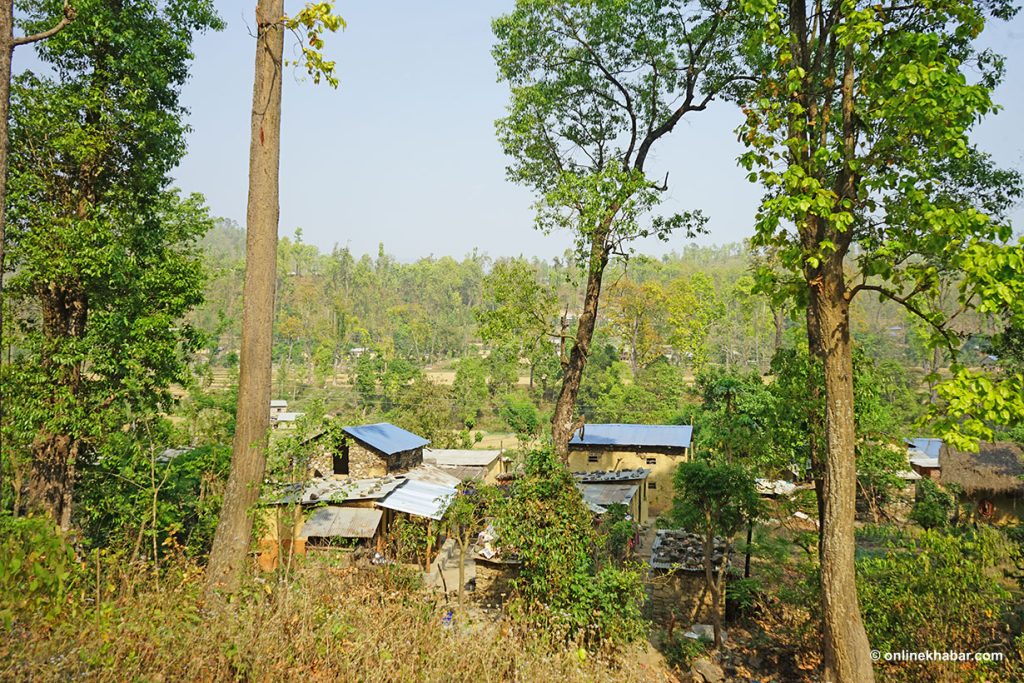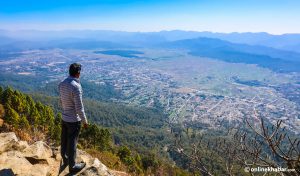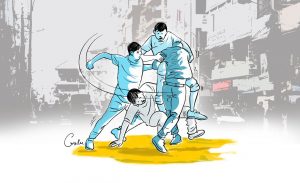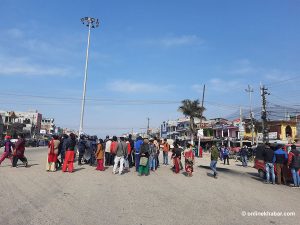Dhuliyabit is the gateway to Birendranagar, the capital of the Karnali province. After you walk downhill for about half an hour from here, you will reach Baluwatar. However, this Baluwater located in Birendranagar municipality-11 contradicts the posh Baluwatar area in Kathmandu with the prime minister’s residence.
There is extreme poverty, deprivation and backwardness. There is no electricity in this settlement and not a single school or health post even for general treatment. There is a dense forest above it while a small stream flows below it.
Despite being within the province’s capital, locals from Baluwatar are deprived of their basic needs. They used to have high hopes when the local government was formed and were expectant of employment opportunities and other services. But, in these five years, nothing has changed. The residents have now warned they will boycott any party or leader who does not address their concerns.
Out of service
The area does not even have an elementary child development class. As a result, the children are deprived of their basic education. When there are no schools nearby, children have to walk through the forest for about an hour to reach Shiva Secondary School, the nearest school in Dhuliyabit.
Philiva Gandharva (18) of Baluwatar says it is very difficult and unsafe to go to school via that road so she goes to additional tuition classes in the morning. Most children, for this reason, do not go to school regularly. So, there are many children in the area who drop out of school before reaching the fifth grade.

The settlement is also deprived of communication. Nepal Telecom’s network does not work here. Some houses have electricity, but they were installed on a person’s initiative rather than that of the government, says Chitra Bahadur Baigar. Likewise, health facilities and transportation have not reached this place. And, locals here are compelled to carry a sick person to a distant hospital.
There was a time when Buddhisara Gandharva (47) used to travel from villages and towns with her husband carrying a sarangi. Many were mesmerised by the melodious tune played to them. But now, there is no one to play sarangi and the younger generation does not know how to play.
Meanwhile, due to the humiliation, they have discontinued their age-old profession which used to be the medium for entertainment and getting information before the age of technology.
Moving to Kalapahad

Sunil Pariyar (22) and Bir Bahadur Baigar (21) of Baluwatar are going to Kalapahad (India). Though Pariyar and Baigar came home only a month ago and they want to live in their own village, there is no way to make a living.
The debts borrowed to make Pariyar’s house/hut and having to manage a living for his elderly mother, father, two sisters, wife and young son’s education do not let him stay idle at home.
“What can we do here? We have a debt of Rs 150,000. There isn’t any employment opportunity here. Then, there is a ban on selling gravel or sand. But, we still have the responsibility for the family. So I have to go to Kalapahad,” says Pariyar.
Pariyar and Baigar are not the only ones, Baluwatar lacks a young population; there is no one over the age of 15. They have all gone to Kalapahad for employment. Others work as drivers and only come home during festivals.
Big promises

There are uncountable stories of the people living in this settlement, who are disappointed and struggling to find their existence. But then again, it is local elections time, the small area is full of big promises of land ownership papers, roads, education, health and employment and reassurance to fulfil those from “leaders” trying to enter their settlement to seek votes.
Chitra Bahadur Baigar, 56, a resident of the area says, “We have sided with all parties for votes and carried their flags following their promises. But, there is no reason to believe them now.”
The main demand for this landless settlement from the past has been the land ownership papers. Waiting for “leaders” to deliver their promises, Bhim Bahadur Gandharva had migrated from Chhingad to Baluwatar and then spent three decades in this settlement waiting for his land ownership papers but was deprived of his basic rights. He has voted for many parties but his wish has yet to come true.
Believing big promises of development and infrastructures, all the citizens of the settlement voted for the ‘sun’ in the last local level elections in 2017. “We gave our votes to CPN-UML. If they win, they claimed, they would change the face of the settlement here and call it Suryatar. But after winning the elections, they never came back,” shares Bhim Bahadur Gandharva.
Locals fear the same fate will repeat again.
This story was translated from the original Nepali version and edited for clarity and length.


























